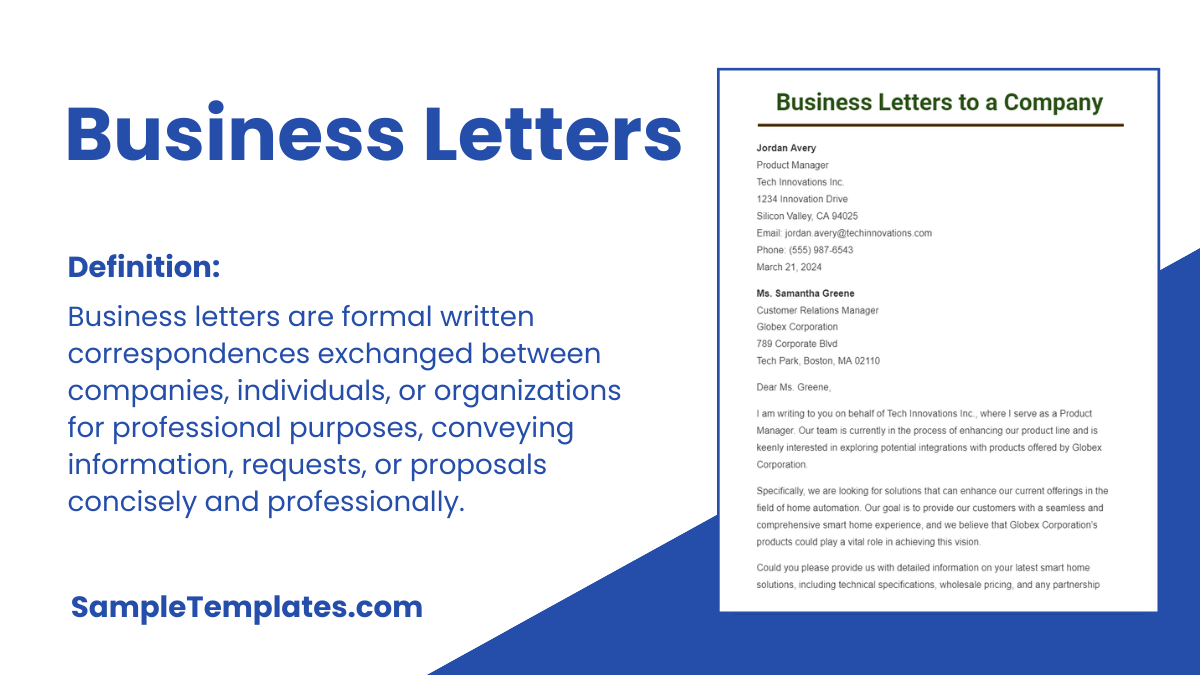Business letters are powerful tools of communication used by organizations and businesses to convey vital information about business activities. It is the most preferred media and is written in a professional business letter manner. A well-crafted letter says more about certain company. Therefore, if you want your company to look unique and distinctive, try to use modern letterhead sample and envelope designed templates. A Business Letters is a representation of your organization. A formal business letter contains the date, information about the author’s and recipient’s and a few paragraphs.
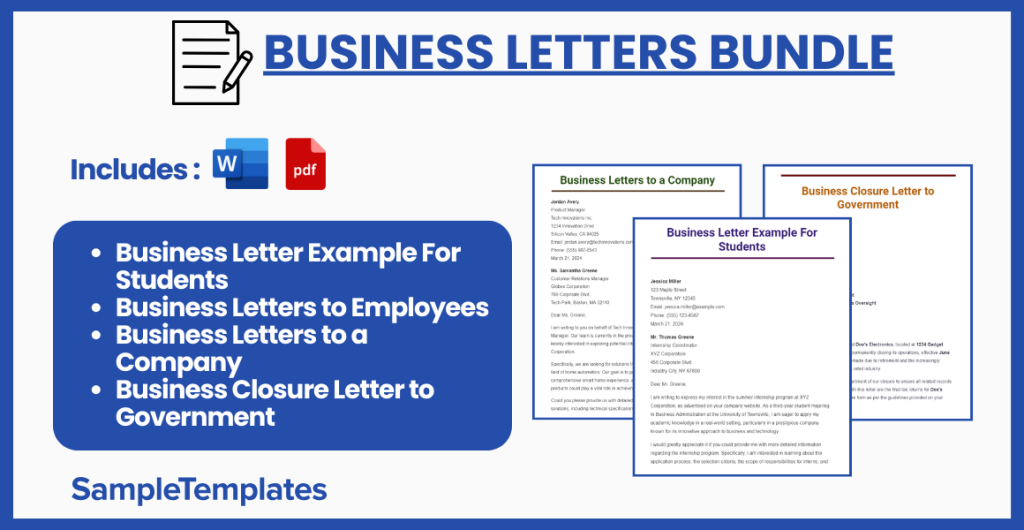
Download Business Letters Bundle
Business Letters to Employees
Policy Change Announcement
ABC Company
123 Business Road
City, State, Zip Code
Date: March 21, 2024
To All Employees:
Subject: Update on Remote Work Policy
Dear Team,
As part of our ongoing efforts to adapt to the evolving needs of our workforce and maintain a productive work environment, we are updating our remote work policy. Starting April 1, 2024, employees will be given the option to work remotely up to two days per week, subject to departmental approval and operational needs.
This decision was made after careful consideration of employee feedback and the proven effectiveness of remote work during recent months. Our goal is to provide flexibility while ensuring that our team collaboration and service delivery remain strong.
Detailed guidelines and eligibility criteria will be distributed by the HR department next week. Managers will work closely with their teams to implement this policy smoothly, taking into account individual roles and project requirements.
We believe this update will contribute to a better work-life balance and overall job satisfaction. Your feedback is important to us, and we encourage you to share your thoughts and questions with your managers or HR representatives.
Thank you for your continued dedication and hard work.
Sincerely,
[Signature for hard copy]
Jane Doe
CEO, ABC Company
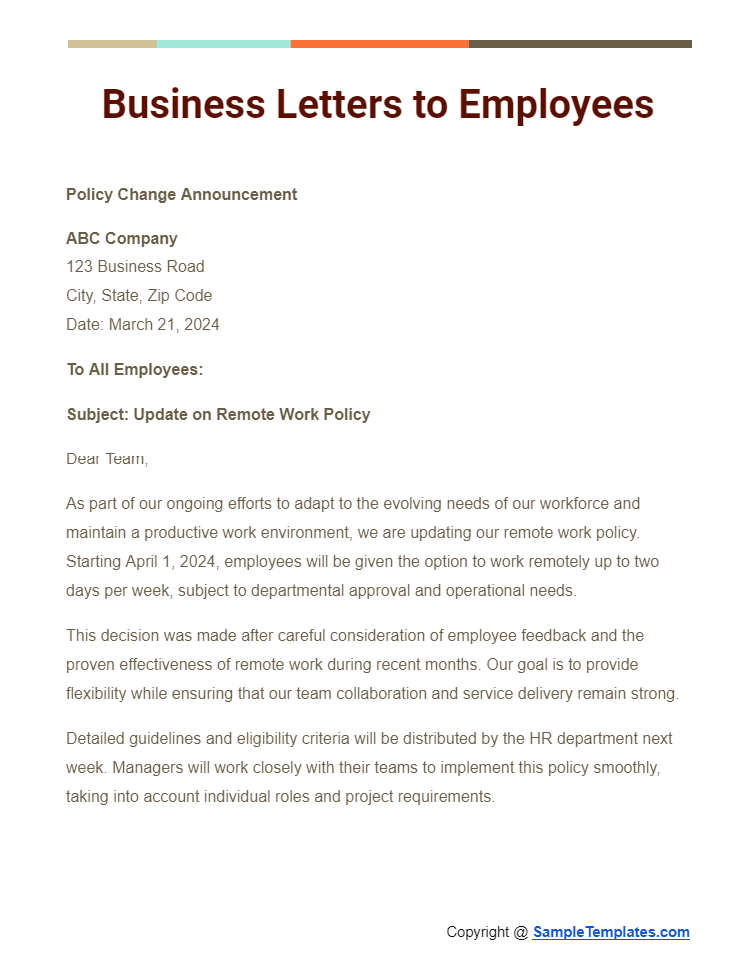
Business Letters to a Company
Jordan Avery
Product Manager
Tech Innovations Inc.
1234 Innovation Drive
Silicon Valley, CA 94025
Email: [email protected]
Phone: (555) 987-6543
March 21, 2024
Ms. Samantha Greene
Customer Relations Manager
Globex Corporation
789 Corporate Blvd
Tech Park, Boston, MA 02110
Dear Ms. Greene,
I am writing to you on behalf of Tech Innovations Inc., where I serve as a Product Manager. Our team is currently in the process of enhancing our product line and is keenly interested in exploring potential integrations with products offered by Globex Corporation.
Specifically, we are looking for solutions that can enhance our current offerings in the field of home automation. Our goal is to provide our customers with a seamless and comprehensive smart home experience, and we believe that Globex Corporation’s products could play a vital role in achieving this vision.
Could you please provide us with detailed information on your latest smart home solutions, including technical specifications, wholesale pricing, and any partnership opportunities that might be available? Additionally, we would appreciate if you could send us any brochures or marketing materials that could help us better understand your product range.
We are very excited about the prospect of working together and believe that a partnership between Tech Innovations Inc. and Globex Corporation could lead to significant advancements in smart home technology.
Please feel free to contact me directly at (555) 987-6543 or via email at [email protected] should you need any further information or to arrange a meeting to discuss potential collaboration opportunities.
Thank you for considering our request. I look forward to hearing from you soon.
Sincerely,
[Signature for hard copy]
Jordan Avery
Product Manager, Tech Innovations Inc.
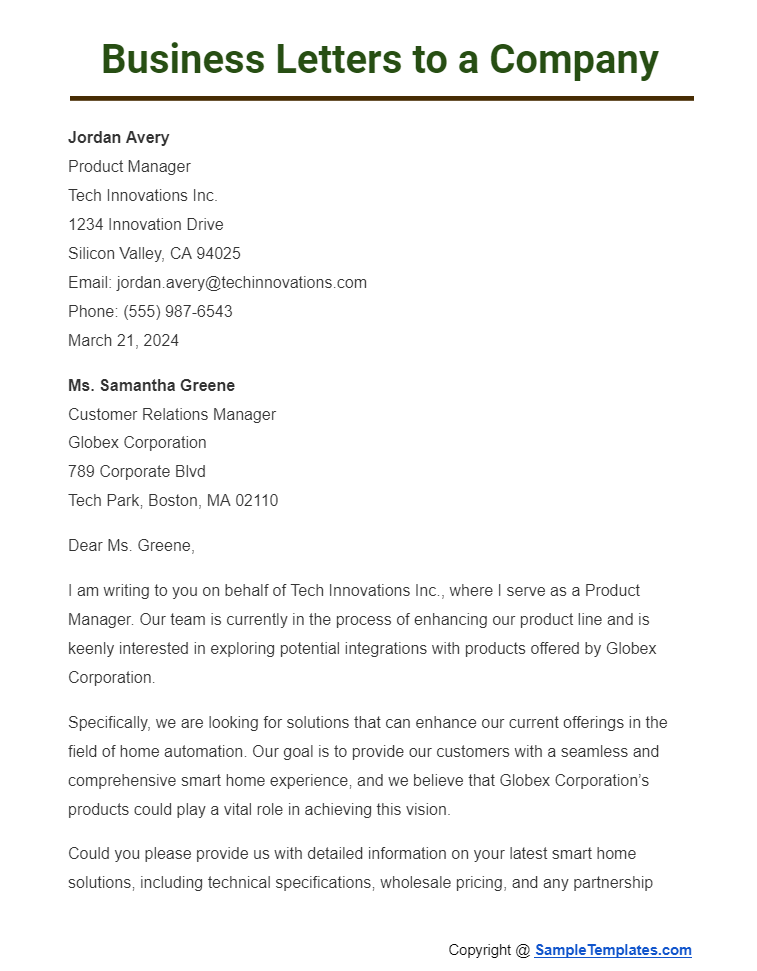
Business Closure Letter to Government
John Doe
Owner
Doe’s Electronics
1234 Gadget Lane
Techville, CA 90210
[email protected]
555-123-4567
March 21, 2024
Business Registration Department
California Department of Business Oversight
4567 Business Blvd
Sacramento, CA 95814
Dear Sir/Madam,
I am writing to formally notify you that Doe’s Electronics, located at 1234 Gadget Lane, Techville, CA 90210, will be permanently closing its operations, effective June 30, 2024. This difficult decision was made due to retirement and the increasingly competitive nature of the electronics retail industry.
As required, I am notifying your department of our closure to ensure all related records are accurately updated. Enclosed with this letter are the final tax returns for Doe’s Electronics and the business closure form as per the guidelines provided on your website.
I kindly request your assistance in guiding us through any additional steps or documentation that may be required to complete this process properly. Specifically, we would like clarification on:
- Any final tax obligations we need to settle and the deadlines for these filings.
- The process for officially terminating our business license and any associated registrations.
- Steps to close our employer payroll account, considering our final payroll will be processed on June 15, 2024.
- Any other formalities needed to comply with state regulations for business cessation.
We aim to fulfill all necessary responsibilities efficiently and are committed to closing our operations in compliance with state regulations. Doe’s Electronics has been proud to serve the Techville community for over 20 years, and we are grateful for the support from your department during our operation.
Please contact me at 555-123-4567 or [email protected] for any further information or to confirm the receipt of this letter and the enclosed documents.
Thank you for your assistance and understanding during this transition period.
Sincerely,
[Signature for hard copy]
John Doe
Owner
Doe’s Electronics
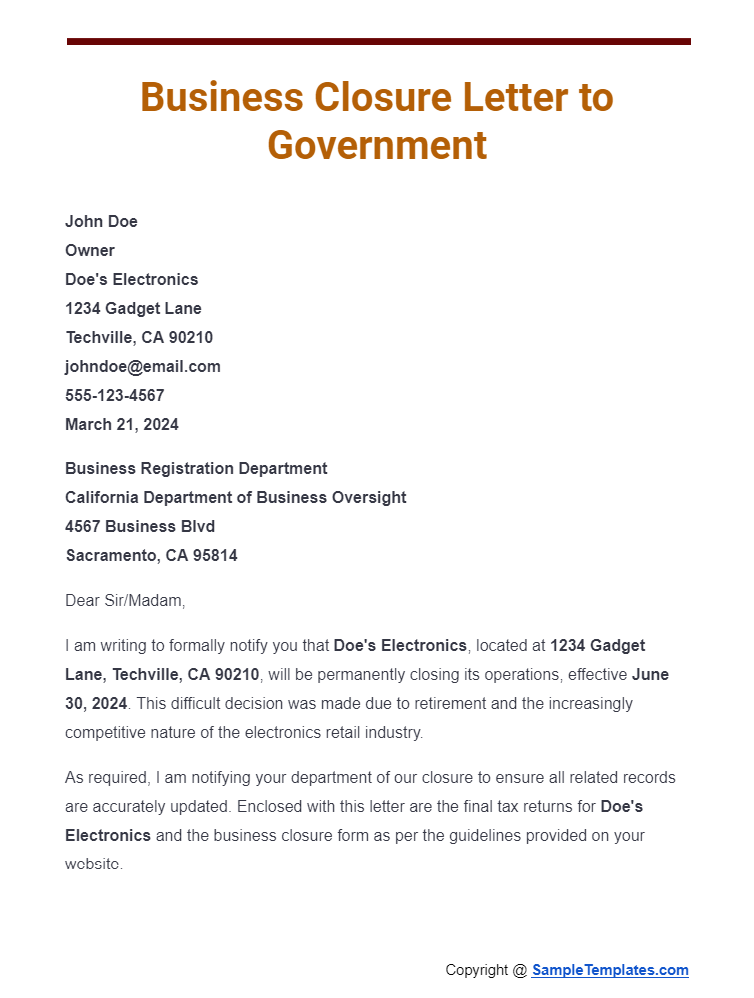
Business Letter Example For Students
Jessica Miller
123 Maple Street
Townsville, NY 12345
Email: [email protected]
Phone: (555) 123-4567
March 21, 2024
Mr. Thomas Greene
Internship Coordinator
XYZ Corporation
456 Corporate Blvd
Industry City, NY 67890
Dear Mr. Greene,
I am writing to express my interest in the summer internship program at XYZ Corporation, as advertised on your company website. As a third-year student majoring in Business Administration at the University of Townsville, I am eager to apply my academic knowledge in a real-world setting, particularly in a prestigious company known for its innovative approach to business and technology.
I would greatly appreciate it if you could provide me with more detailed information regarding the internship program. Specifically, I am interested in learning about the application process, the selection criteria, the scope of responsibilities for interns, and any opportunities for specialization within the program. Additionally, insights into the mentorship and training components of the internship would be invaluable.
My academic and extracurricular involvement has equipped me with a solid foundation in business principles, teamwork, and leadership. I am particularly drawn to XYZ Corporation’s commitment to fostering innovation and leadership skills among its interns. I believe that participating in your internship program would not only complement my academic pursuits but also significantly contribute to my professional development.
I have attached my resume for your review and would welcome the opportunity to discuss how my background, skills, and enthusiasms align with the goals of the XYZ Corporation internship program. I am available for an interview at your convenience and can be reached at (555) 123-4567 or via email at [email protected].
Thank you for considering my request. I look forward to the possibility of contributing to your team and gaining invaluable experience at XYZ Corporation.
Sincerely,
[Signature for hard copy]
Jessica Miller
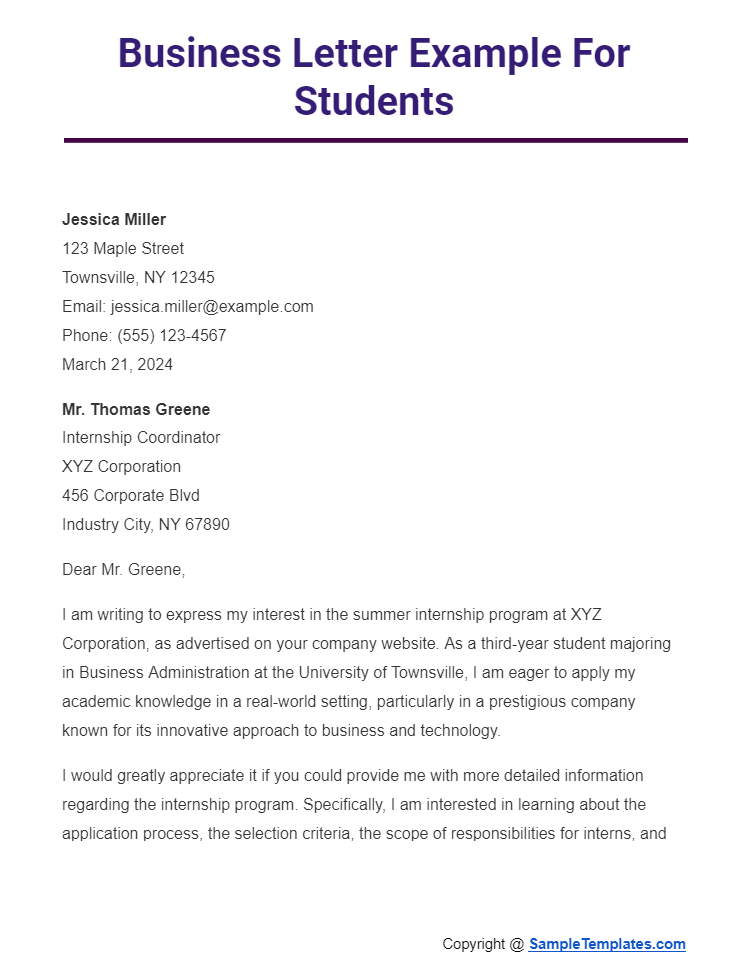
Browse More Templates On Business Letters
Formal Business Letter Template
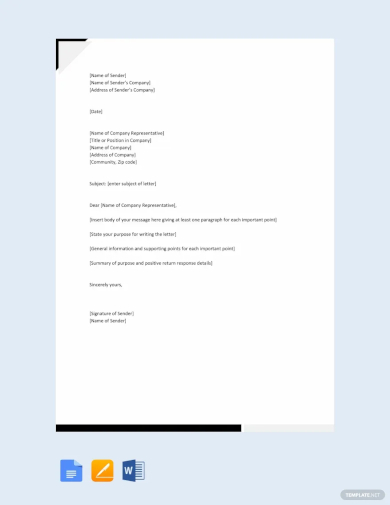
Sample Closing Business Letter to Clients Template
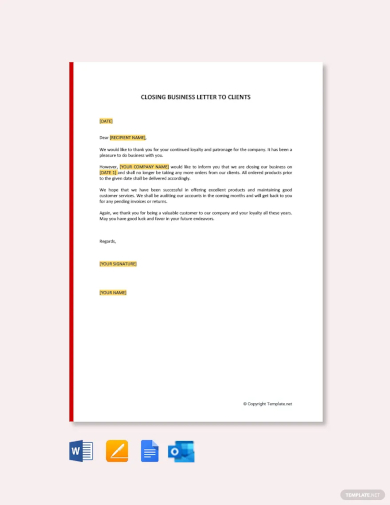
Structure of a Business Letter
The structure of a professional business letter is designed to present information in a clear, professional manner. Here is the typical structure, broken down into its essential components:
- Sender’s Address: Start with your address at the top of the letter. It’s customary to omit your name here; just include the street address, city, state, and zip code. In email format, this part can be omitted, as your contact information is usually included in your email signature.
- Date: Place the date directly below the sender’s address. Spell out the month to avoid confusion (e.g., March 21, 2024).
- Recipient’s Address: After the date, include the recipient’s name, title, company name, and address. If you know the recipient well, you can address them by their first name, but in more formal situations, use Mr., Ms., Dr., etc., followed by the last name.
- Salutation: Begin the body of the sample letter with a salutation, such as “Dear [Recipient’s Name],” followed by a colon or comma. If you don’t know the name of the person you are writing to, “Dear Hiring Manager,” “To Whom It May Concern,” or “Dear Sir or Madam” are acceptable but less personal options.
- Body: The body of the letter is where you communicate your message. It’s typically divided into three parts:
- Introduction: Briefly state the purpose of your letter in the first paragraph.
- Main Content: Provide the details of your request, proposal, or the information you are conveying. This section may consist of several paragraphs, depending on the complexity of your message.
- Conclusion: Summarize the main points, restate your request or next steps, and express your appreciation for the recipient’s time and consideration.
- Closing: End your letter with a polite closing, such as “Sincerely,” “Best regards,” or “Thank you,” followed by a comma.
- Signature: Leave four spaces after the closing for your signature, then type your full name. If you’re sending a printed letter, sign your name in the space above your typed name. Include your job title below your name if it’s relevant to the letter.
- Enclosures and CC: If you’re including additional documents, indicate this by typing “Enclosures:” followed by a list of what’s included at the bottom of the letter. If you’re sending the letter to someone else as well, indicate this with “CC:” followed by their name and title.
This structure helps ensure your business letters are organized, professional, and effective in communicating your intended message.
Formal Business Apology Letter Template
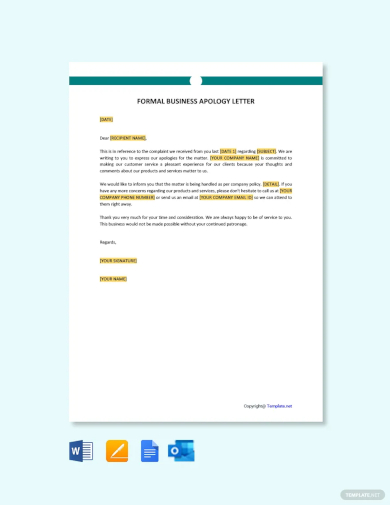
Formal Business Proposal Letter Template
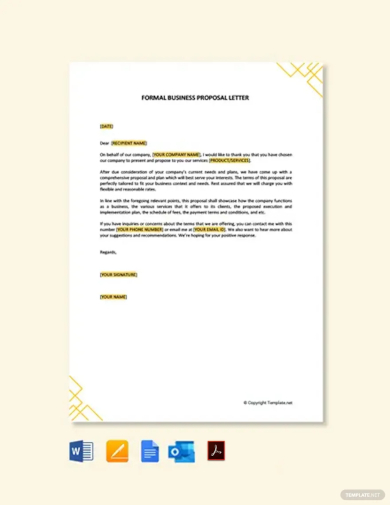
Formal Business Invitation Letter Template
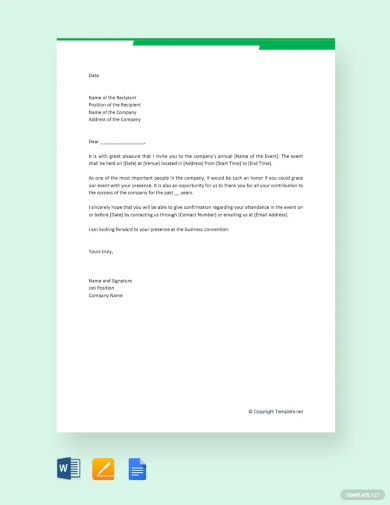
Free Formal Business Thank You Letter Template
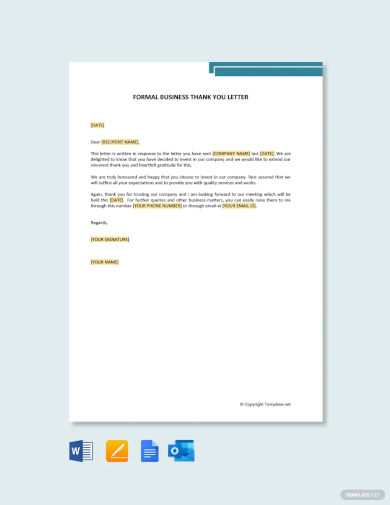
Tips For Writing a Business Letter

Writing a business letter requires a blend of professionalism, clarity, and adherence to standard formats. Here are eight tips to help you craft effective business correspondence:
- Understand Your Purpose: Before you begin writing, be clear about the purpose of your sample letter. Whether it’s a request, a proposal, an apology, or a thank you, knowing your objective will help structure your letter effectively.
- Keep It Concise: Business letters should be succinct and to the point. Avoid unnecessary details that could detract from the main message. Aim for short paragraphs that are easy to read and understand.
- Use a Professional Tone: Even if you know the recipient well, maintain a professional tone. Use polite language and avoid slang or overly casual phrases. This professionalism reflects respect for the recipient and the seriousness of your intent.
- Follow the Standard Format: Stick to the traditional business letter format, which includes the sender’s address, date, recipient’s address, salutation, body, closing, and signature. Consistency in format helps convey a sense of professionalism.
- Personalize the Salutation: Whenever possible, address the recipient by name (e.g., “Dear Mr. Smith”). If you’re unsure of the recipient’s name or title, do some research. Using a generic salutation should be a last resort.
- Be Clear and Direct: State your purpose in the first paragraph to immediately inform the reader of the letter’s intent. Be direct but polite in conveying your message, requests, or expectations.
- Proofread and Edit: Before sending your letter, proofread it for spelling, grammar, and punctuation errors. Also, ensure the information is accurate and the tone is appropriate. A letter free of errors shows attention to detail and professionalism.
- Include a Call to Action: If applicable, end your letter with a clear call to action. Specify what you hope the recipient will do next, whether it’s to reply, meet, or review attached documents. Providing a clear next step can facilitate a quicker response or action.
Writing a formal business letter is a skill that improves with practice. By following these tips, you can ensure that your letters are effective, professional, and tailored to achieve your communication goals.
Formal Business Inquiry Letter Template
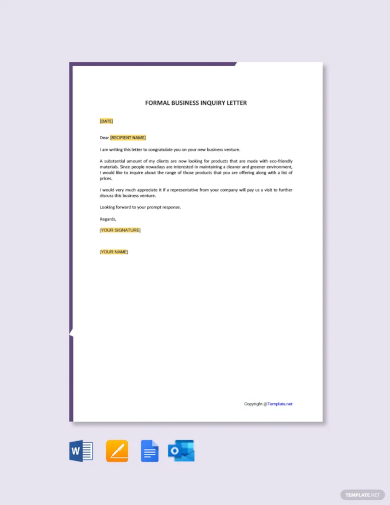
Formal Business Meeting Invitation Letter Template
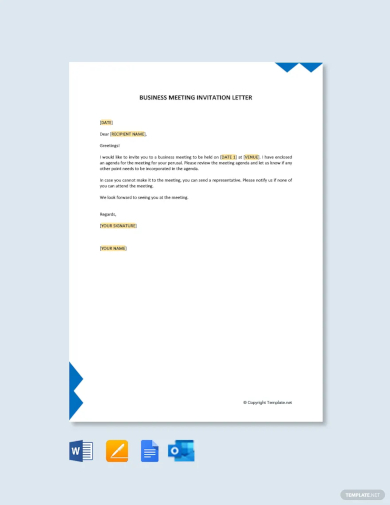
Basic Business Application Letter Format
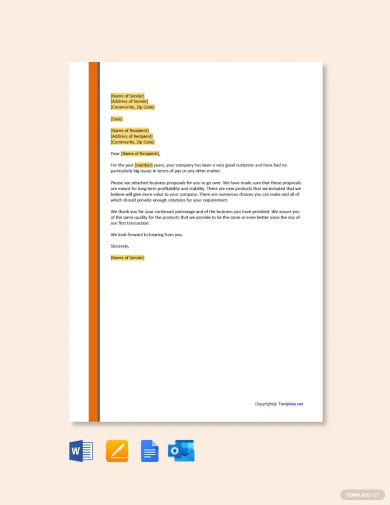
Functional Business Analyst Cover Letter Template
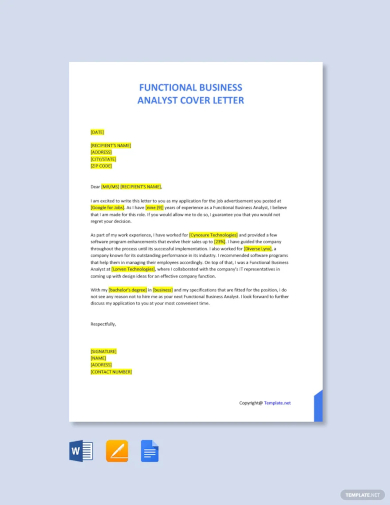
Free Termination Of Business Relationship Letter Template
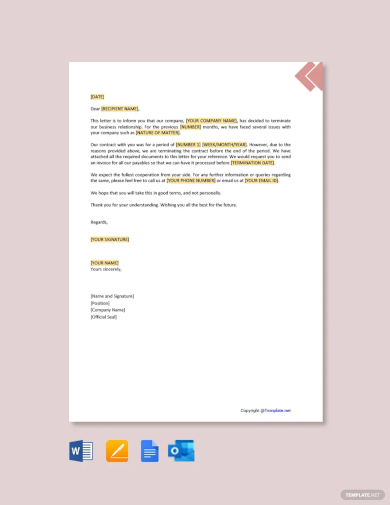
Sample Trading Business Introduction Letter Template
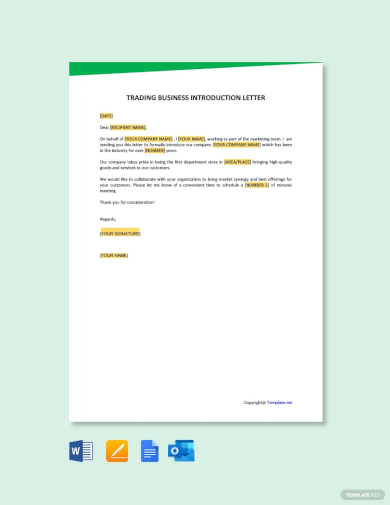
Product Business Proposal Letter Template
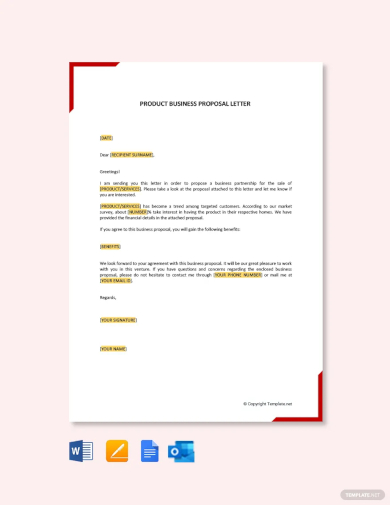
Simple Formal Business Letter Format
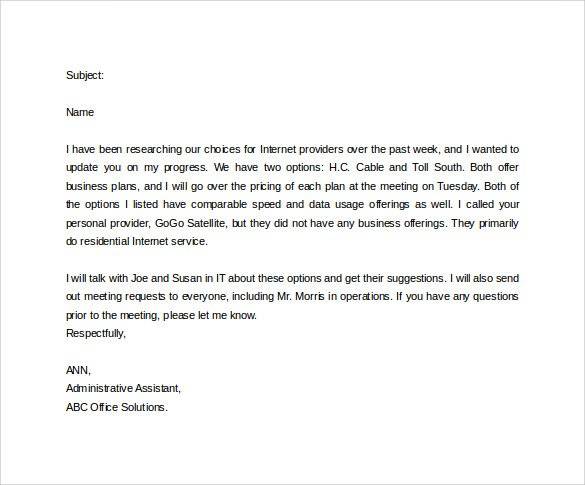
Simple formal business letter takes the format of a simple email mentioning the subject of the mail, followed by a crisp content stating clearly the objective behind the business communication.
Formal Business Letter Format Template
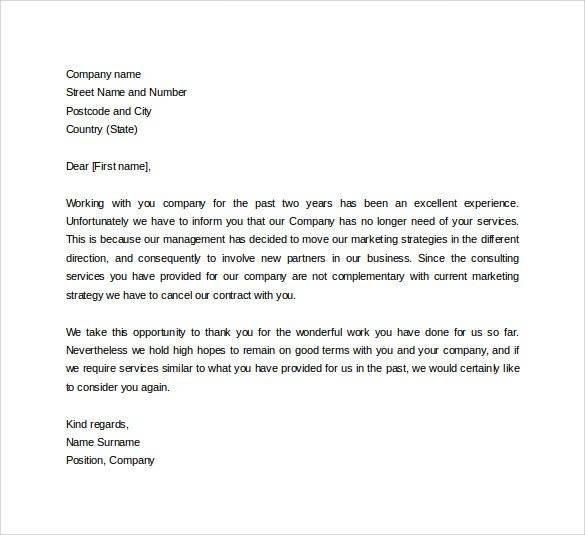
The business letter structure in formal business letter normally starts with the company details to which the business letter is addressed to. In case it is a business to business communication, these letters can also be drafted in the respective company’s letterhead.
Formal Business Letter Outline
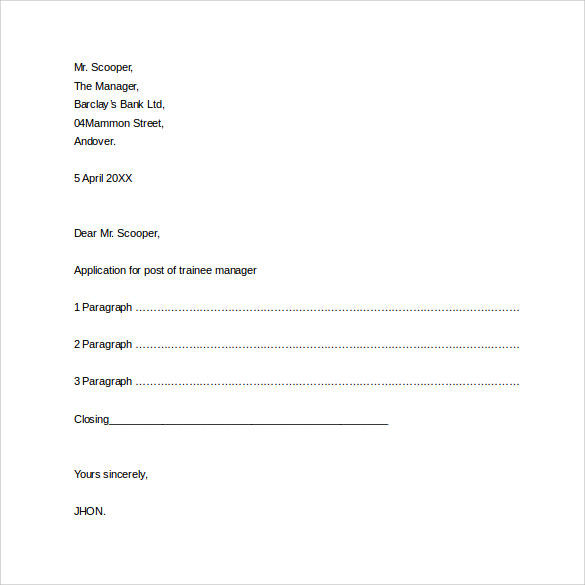
There are samples, examples and formats of business letters uploaded in the web which users can readily download and customize to suit their purpose. These polite letters are mostly in Word or PDF format.
Basic Business Letter Template
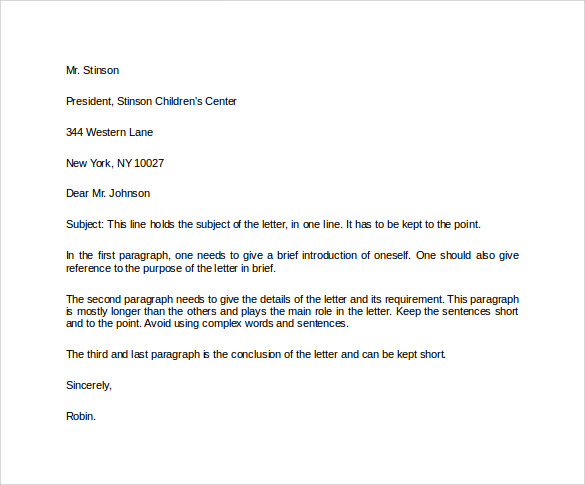
There are certain parts of business formal letters which are quite common in most of the business letters such as subject, addressing, salutation, and more importantly the content of the letter.
Printable Formal Business Letter Format
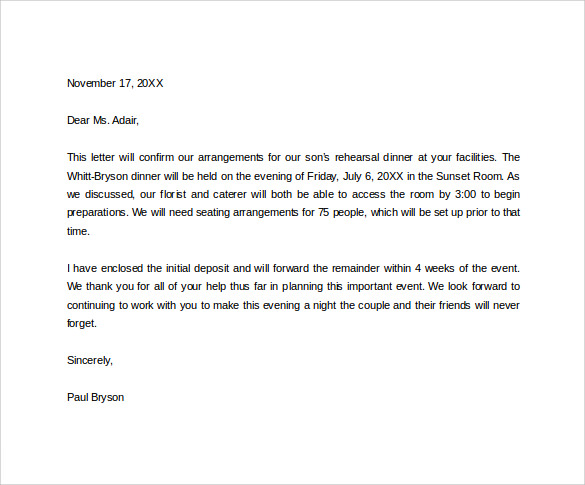
Business letters are also used in placing official orders or discussing about possible business deals, which is when the content of the letter should highlight the key highlights and data points in the business deal.
Formal Business Letter Format in Word
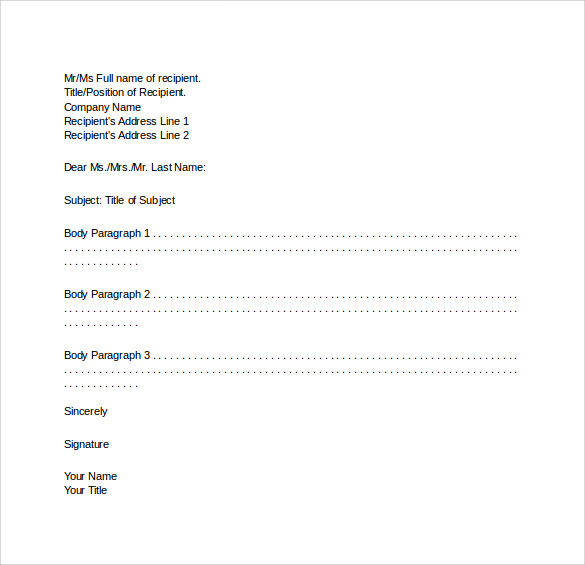
There are many samples, examples and formats of business letters available in the web which is freely downloadable and printable by users. These are mostly generic in nature which can be customized to suit the specific needs of the user.
Business Letters are the most commonly used mode of communication for business interaction and other professional dealings. These letters, unlike normal letters and messages, are extremely crisp and concise expressing the key pointers which needs to be conveyed to the stake holders. Apart from the precise content, most of these formal business letters have a predefined format in which it needs to be drafted, depending upon the business. In addition to that, basic information such as date, salutation, subject etc. should be mentioned for better clarity.
Types
Although most of the correct business letters are formal and professional in nature and informative, still they can differ depending upon the nature of the business that the firm is dealing in. Good Business letter can be in the form of an application, or in the form of an email – all of which are mostly drafted in the form of Word document or PDF.
How to create?
Business letters are mostly designed abiding by a strict format as prescribed by the business, and the same can be drafted both in soft copy (electronic format) or hard copy.
Formal Email Business Letter Template
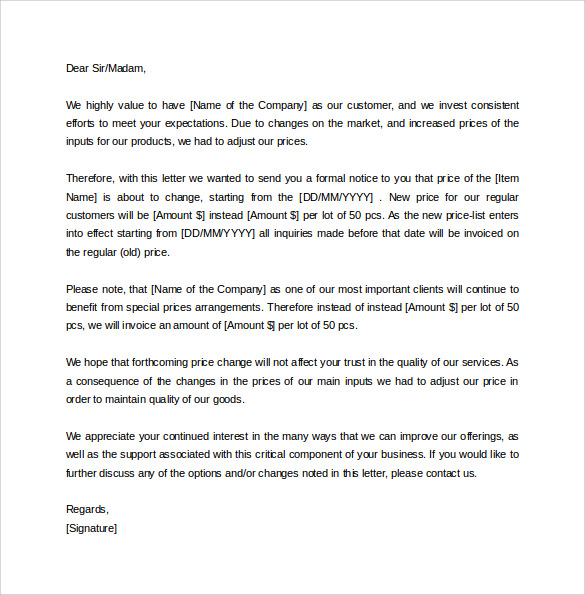
Formal Email business format, as evident from the profile name, follows the same format and practices as an official mail, starting with the salutation of the recipient of the mail, followed by the content.
Sample Formal Business Letter Format
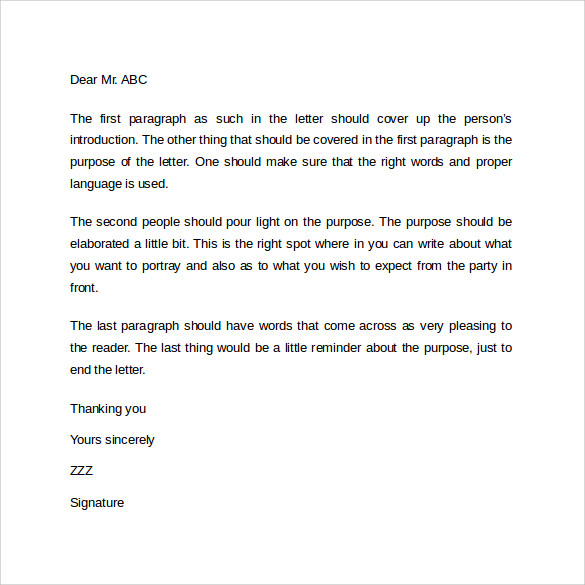
These are simplistic Microsoft formal business letter templates which are often used by businessmen to communicate serious official information with their stakeholders. These kind of letters should be drafted in concise paragraphs with the introduction paragraph setting the context.
Basic Formal Business Letter Format
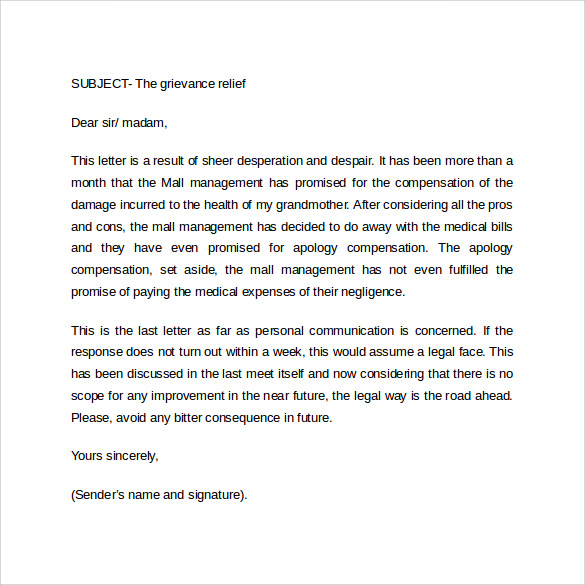
Businesses can directly use free business templates from the web which are in freely downloadable and printable format. The mention of a precise subject is mandatory to set the context of the letter.
Free Formal Business Letter Template
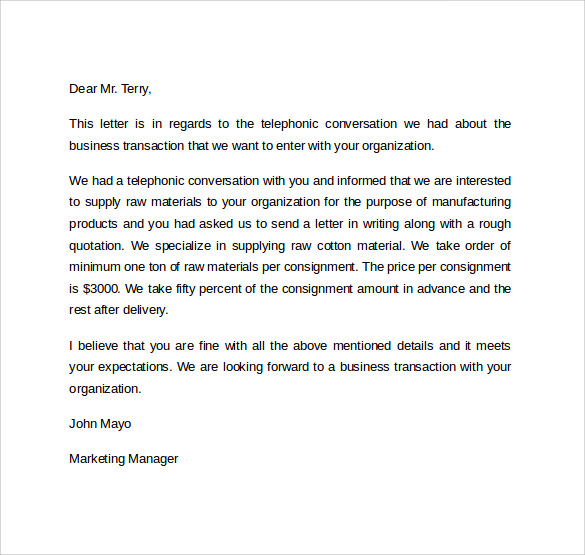
There are semiformal business letter formats as well which are often used in official communication. Such communications can be used for internal stakeholders, or for other semi-formal events. These letters, too, take the format of a Word or a PDF.
Formal Business Correspondence Letter Template
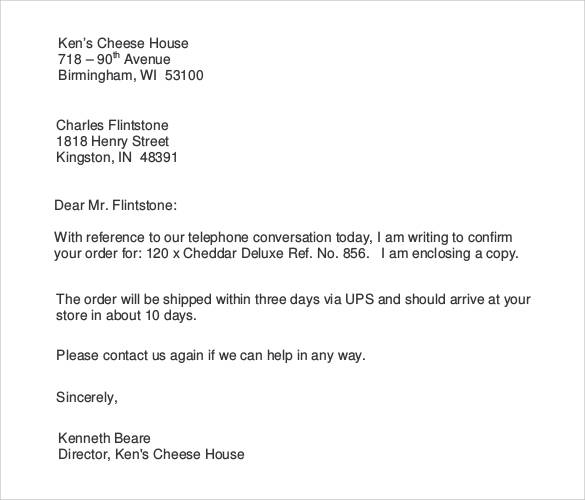
Formal Business Letter Block Style Template
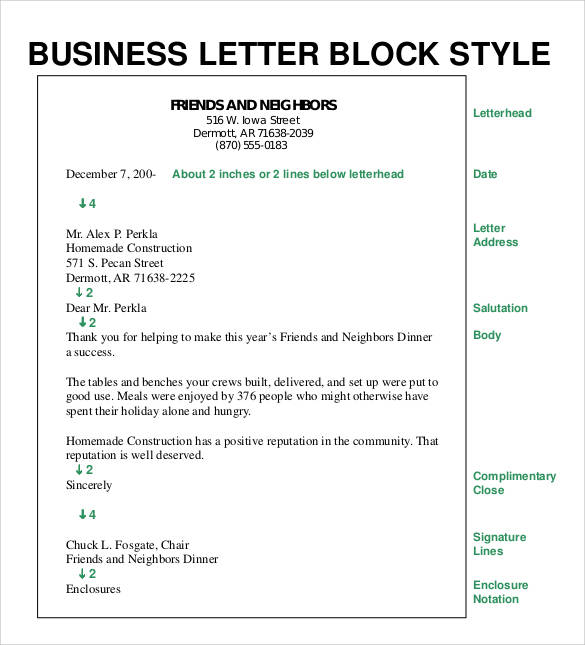
Formal Business Letter Layout Template
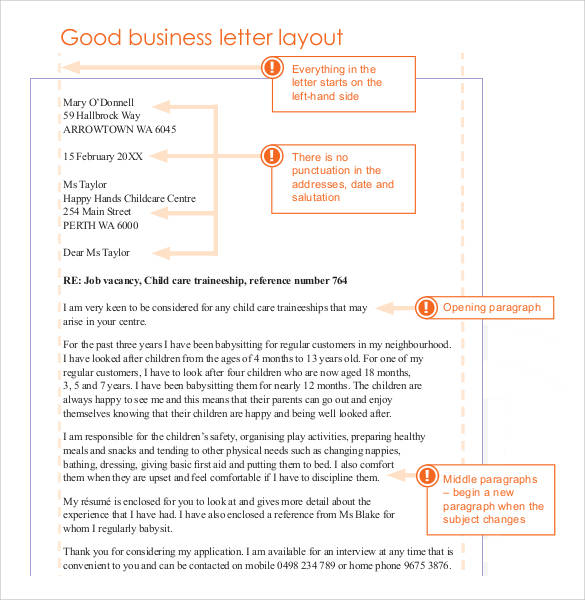
Formal Business Letter Model Template
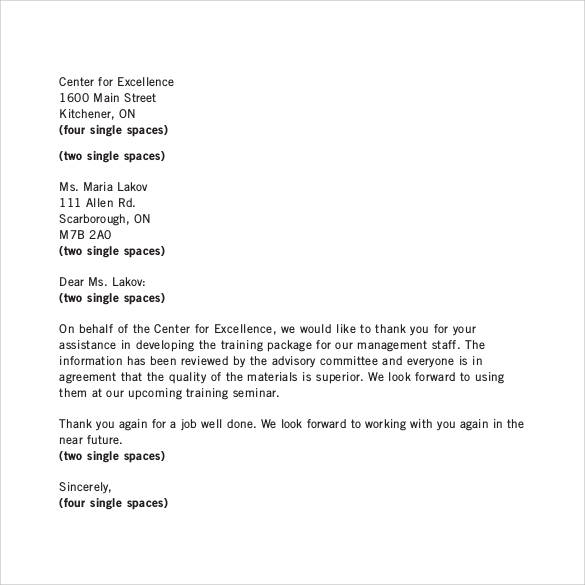
Formal Business Letter Writing Template
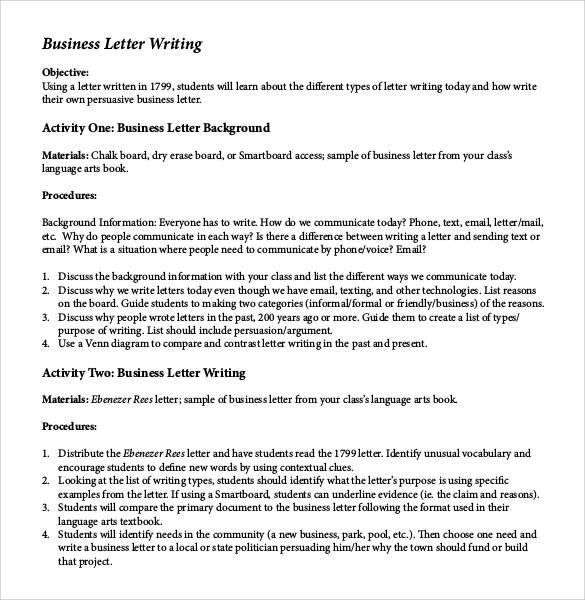
Formal Business Reference Letter Template
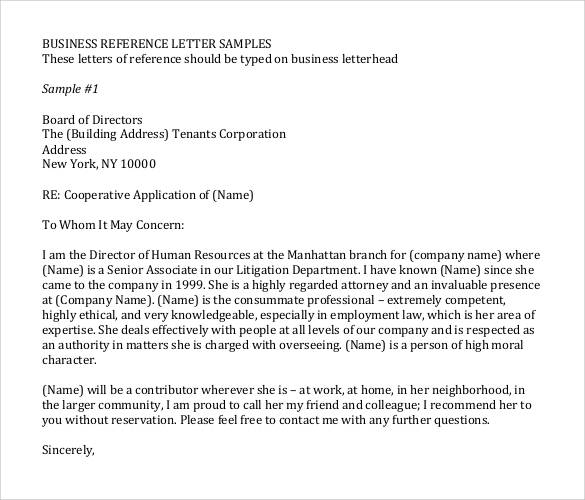
Formal Corporate Business Letter Template
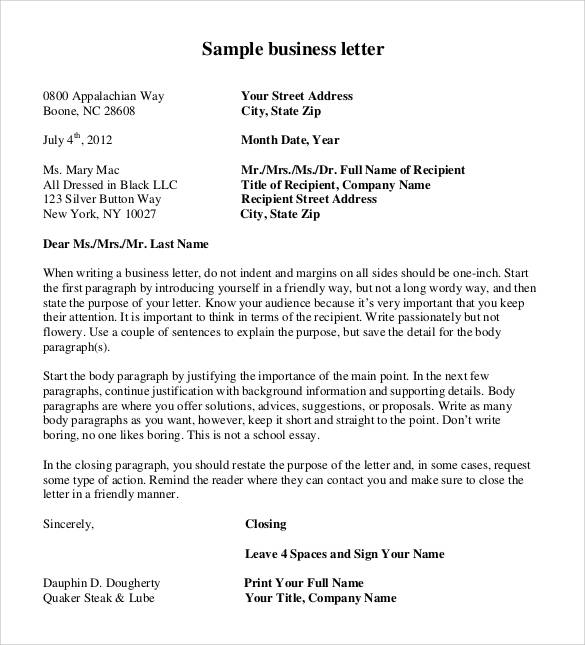
Formal Persuasive Business Letter Template
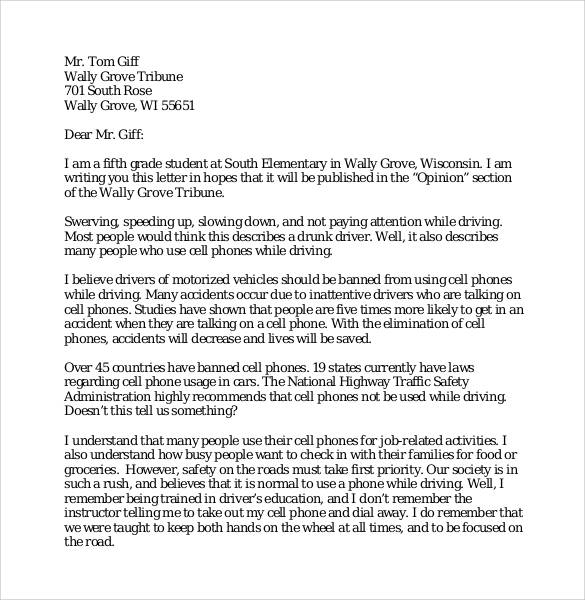
Formal Lesson Plan Business Letter Template
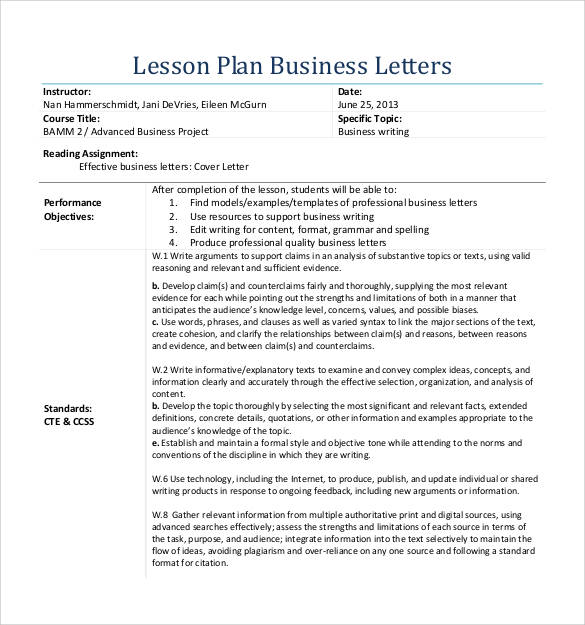
Proper Formal Business Letter Template
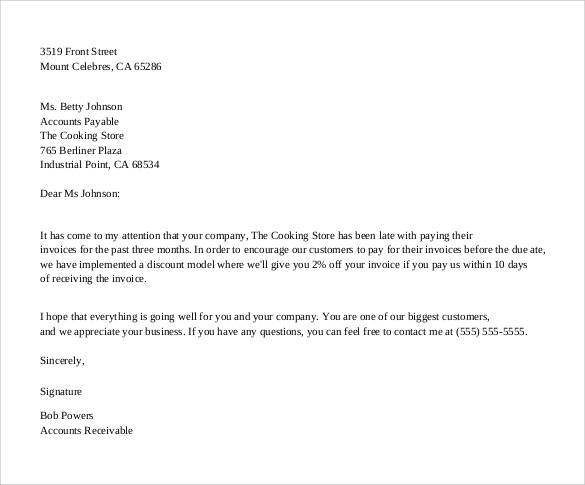
Free Formal Business Letter Format
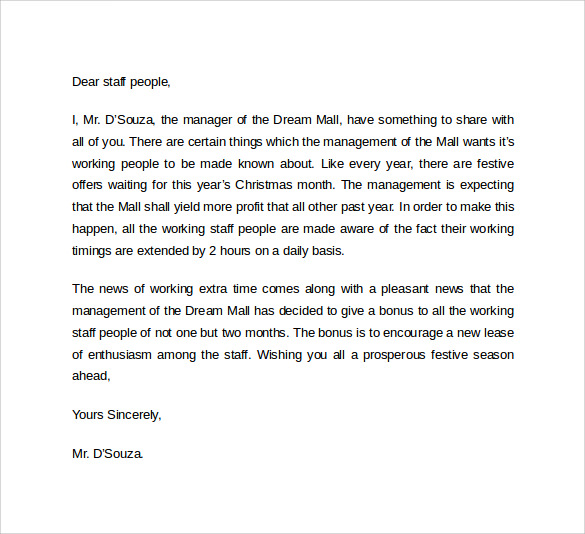
Free Formal Business Letter Template
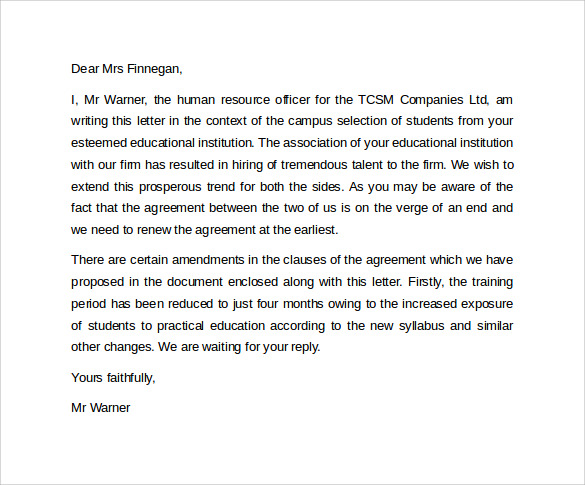
Formal Business Letter Outline
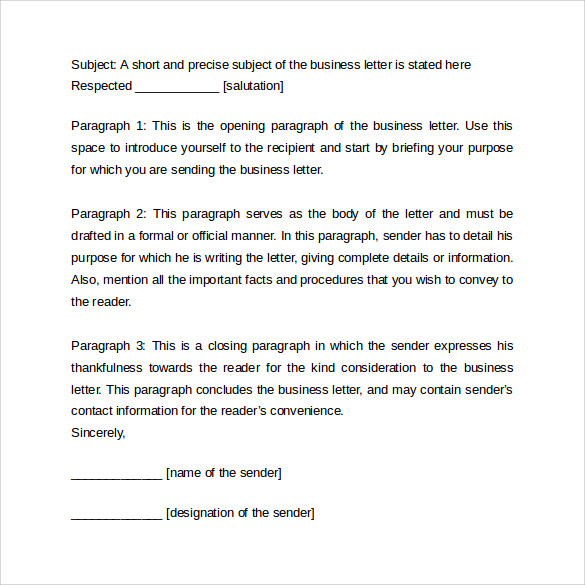
Simple Formal Business Letter Template
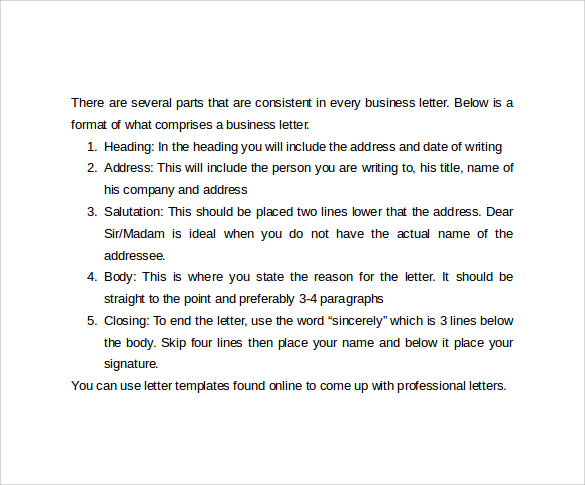
Minimalist Business Letter Template
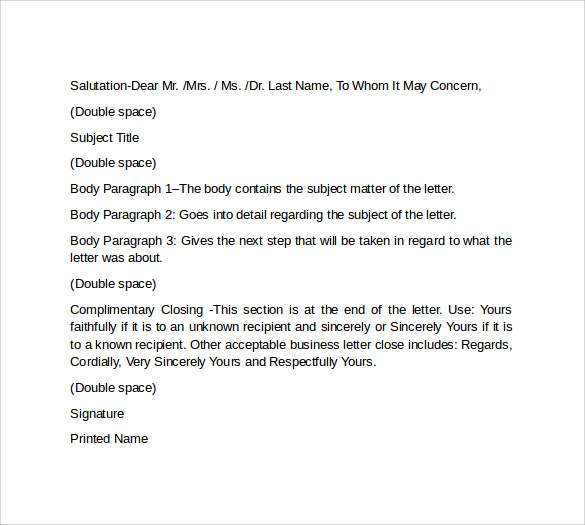
Formal Business Letter Format Example
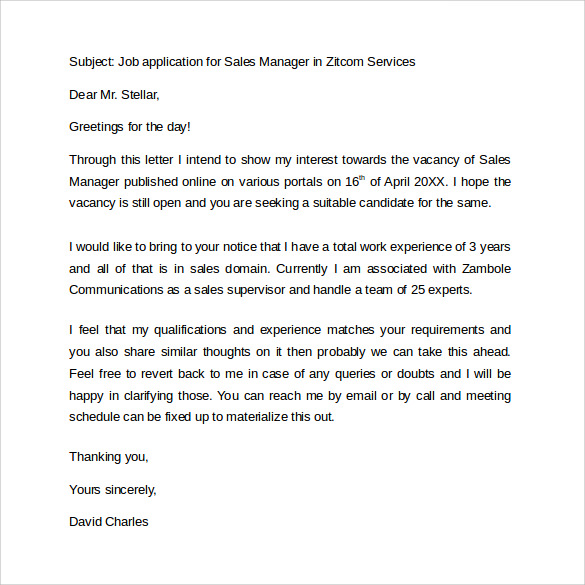
.
Formal Business Letter Template
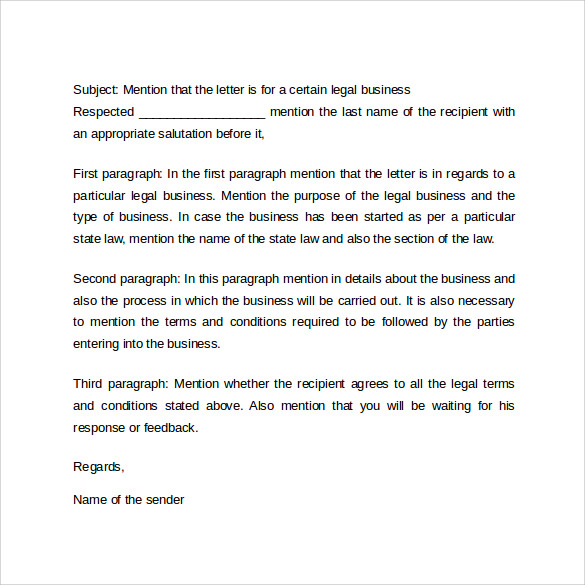
.
Editable Formal Business Letter Format
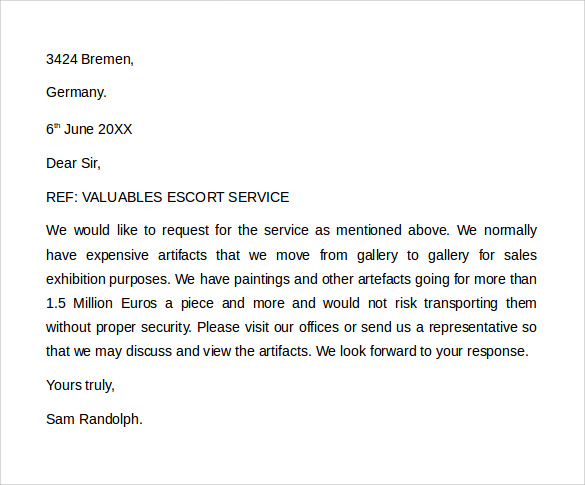
Formal Business Writing Letter Format
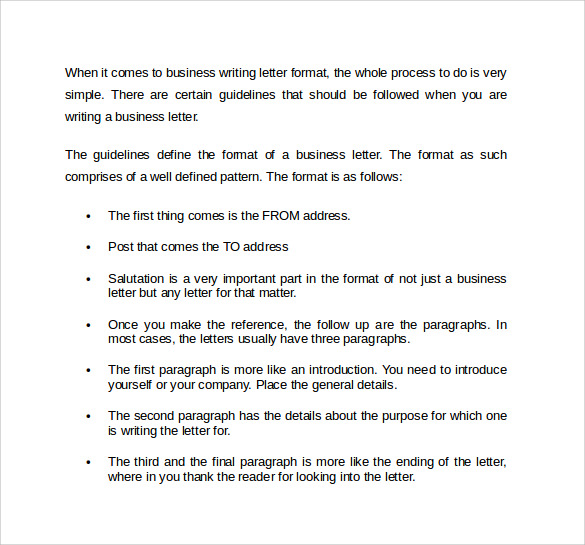
Downloadable Formal Business Letter Format
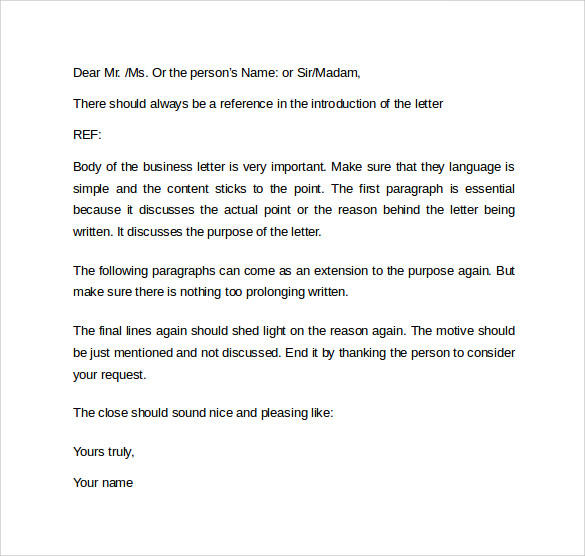
There are two styles of writing formal business letters: block style and administrative management style (AMS). Block style is commonly used format in business formal letters. It has greetings and closing remarks, while AMS style is applicable in direct situations and internal memos.It is effective and professional way of passing vital information. Formal business letters are governed by rules and regulation therefore there are no mistakes on these templates.
How To Create A Formal Business Letter?
Creating a Formal Business Letter is very easy. To begin with you need to add a proper salutation or courtesy, following this a heading must be added to the letter. After the first two steps, the complete details of the company business letter including the name, address, contact information, website and email address must be added to the letter. The address and details of the recipients will also be included followed by the body of the letter, the signature of the sender and the company stamp.
Types Of Business Letters
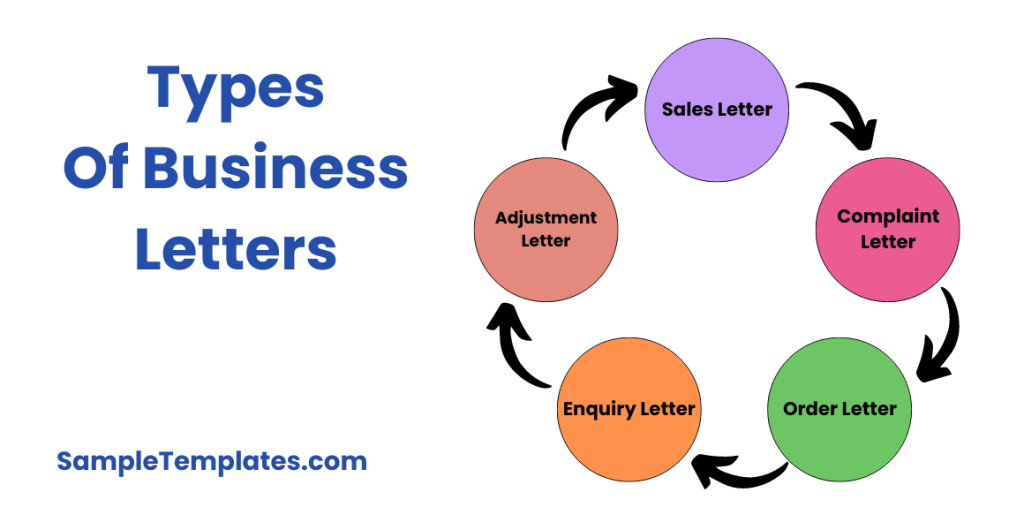
Based on the purpose of the letter, business letters are classified into various types. However, it should be noted that all these corporate letters follow an official business letter format. However, the structure of the letters may vary. The different types of business letters are
- Sales Letter
- Complaint Letter
- Order Letter
- Enquiry Letter
- Follow-Up Letter
- Adjustment Letter
- Recommendation Letter
- Resignation Letter
- Cover Letter
- Acknowledgement Letter
- Customer Relations Letter
- Special Request Letter
- Refusal Letter
There are several types of business letters that are sent out by companies and organizations on a regular basis. These include surrender letters, complaint letters, thank you letters, letters to banks, letters to government authorities, letters to tax authorities and so on. Basically business letters are needed to correspond with all the stakeholders of the firm. These stakeholders include shareholders, investors, customers, bankers, management and so on.
Uses
Business Letters are exhaustively used for business communication – be it for any purpose such as communication with stakeholders such as vendors, suppliers, clients etc, inter-organizational declarations or memos and many others.
These letters, however, must abide by legal rules and regulations as they have legal cover letter implications. Hence, any technical or logical flaw is not allowed.
There are six formats of writing a formal business letter:
- Block – text are aligned to the margin while no indention in the paragraphs.
- Standard- involves the use of a colon after greetings
- Opening- using no punctuation after greetings
- Modified block – the text is aligned to the left margin apart from the authors address, date and closing.
- Modified Semi block -the text is aligned to the left margin apart from the writers address, closing and date
- Semi block- texts are aligned to the margin while paragraphs are indented.
Formal Business Letter
When drafting a Formal Business Letter, it is essential that it be drafted in a proper and professional manner. A proper salutation, heading, body and closure must be included in the letter. When working on drafting a business letter, you also need to add important details of the company such as the address, name, contact information, website and other information. The company stamp and the signature of the person sending out the letter will also be required in the formal business letter. Several different types of business letters are used for correspondence including surrender letters, thank you letters, complaint letters and various others, but most of them follow the same format.
So, when sending out a Professional Business Letter or email, you need to make sure that you draft the letter properly and it is formatted correctly. A professional business letter must leave a positive and profound impact on the minds of the receivers and should play a role in increasing the goodwill of the firm.
How do you start a business letter example?
A business letter typically starts with a formal greeting, such as “Dear Mr./Ms. [Last Name],” followed by an introduction stating the purpose of the letter and any relevant context or background information.
What are 3 things that must be in a business letter?
A business letter typically includes the sender’s address, date, and recipient’s address at the beginning. It also contains a formal greeting, concise body paragraphs, and a courteous closing.
What is the main purpose of business letter?
The main purpose of a business letter is to communicate formally and professionally between organizations or individuals. It conveys important information, requests, inquiries, or proposals in a structured and professional manner.
How do you end a business letter?
End a business letter with a courteous closing, such as “Sincerely,” “Best regards,” or “Thank you.” Follow it with your full name and any relevant titles or affiliations, then your signature
Is a business letter the same as a formal letter?
Yes, a business letter is a type of formal letter. Formal letters encompass various types of correspondence used in professional settings, including business letters, letters of inquiry, job application letters, and more.
Writing a business letter is no mean task which is why people make use of business letterhead templates. Using these ensures that they do not miss out on anything important and keep in tow with the agreed format. These templates are readily available online and can be downloaded and customized as per the requirements of the users.
If you have any DMCA issues on this post, please contact us!
Related Posts
Teacher Letter of Recommendation Samples & Templates
Business Proposal Letter to Client Samples & Templates
Company Introduction Letter Samples & Templates
Resignation Letter for Medical Samples & Templates
Letter of Intent Samples & Templates
Letter of Intent for a Job Samples & Templates
Lease Proposal Letter Samples & Templates
Letter of Inquiry Samples & Templates
Character Reference Letter Samples & Templates
Claims Letter Samples & Templates
Response Letter Sample & Templates
Follow Up Letter Samples & Templates
Sample Project Proposal Letter Templates
Donation Letter Samples & Templates
Addressing a Formal Letter Samples & Templates
